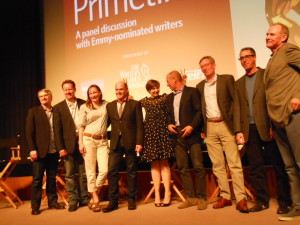 Television writers may not have the glitz and glam of actors, but they definitely have the wittiness and self-effacing factors down pat.
Television writers may not have the glitz and glam of actors, but they definitely have the wittiness and self-effacing factors down pat.
That’s why it’s always such a pleasure to attend the annual Sublime Primetime event, honoring Emmy-nominated writers, sponsored by the Writers Guild of America, West, the Writers Guild Foundation and Variety.
This year’s edition, held September 19 at the packed Writers Guild Theater in Beverly Hills, was another no-holds-barred evening filled with inside jokes, laughter, insight into the behind-the-scenes workings of top television shows – and even a little snarkiness.
“The Walking Dead’s” showrunner and EP Glen Mazzara hosted the confab and pulled no punches as he grilled nominees Dave Boone (65th Annual Tony Awards and 84th Annual Academy Awards), Semi Chellas and Matthew Weiner of “Mad Men,” Lena Dunham (“Girls”), Ted Mann (“Hatfields & McCoys”), Alex Gansa and Howard Gordon of “Homeland” and Billy Martin (“Real Time with Bill Maher and 84th Annual Academy Awards (Special Material)).
The 64th Primetime Emmy Awards, airing Sunday night on ABC, will honor outstanding writing in eight categories: comedy series, drama series, miniseries, movie or dramatic special, variety series, variety special, nonfiction programming, animated program and short format-animated program.
The cast on stage was a good representation of the first five of those categories. Among them, multiple nominees like Martin, big past winners like Weiner and in the case of Dunham, nominated not only for writing, but for directing and acting, an Emmy first-timer.
Martin calls himself the Susan Lucci of the Primetime Emmys. He’s been nominated 17 times, including three nods this year. That’s why he keeps renting a tux, instead of going out and buying one to wear to all the award shows he’s attended. But maybe if he would just own one, his luck would change.
Weiner, like Gansa, is also a showrunner, and has racked up nine Emmy Awards, two for writing on “The Sopranos” and – do the math, he said to Mazzara – seven for “Mad Men.” It’s walking-on-eggshells time for Weiner on Sunday. If his show wins for best drama series, it would be the first time in Emmy history that a drama series has taken home the trophy five times.
For those keeping track, and many of you are, here’s the scorecard for consecutive Outstanding Drama Series wins:
Mad Men: 2008, 2009, 2010, 2011
Hill Street Blues: 1981, 1982, 1983, 1984
West Wing: 2000, 2001, 2002, 2003
And for non-consecutive wins, L.A Law took trophies in 1987, 1989, 1990 & 1991.
In their own words, here are some of the highlights of the writerly discussion:
Weiner: “Emmy voters are not as old as they say. They’re geniuses. Our show has no real genre, but it’s reliably depressing and cathartic. We tell stories outside of the era, of human life – how hard it is to be a person. The show doesn’t have a formula. There are many talented people who contribute their experiences to the show.”
Boone: “People are convinced they’re going to kill on award shows with their own jokes or something someone told them in the limo on the way over. Theater actors who respect playwrights are the only ones, on the Tony Awards, who read every word we write for them.”
Dunham: “Everyone asks about the scene in the show where she explains to her parents that they should still support her so she could be ‘the voice of her generation.’ It seemed funny, but she said it when she was on drugs.”
Mazzara, to Gordon: “Claire is bipolar. What network executive is she based on?”
Gordon: “Her character wasn’t about being likable, it was about being confident, so she didn’t appear unbalanced.”
Martin: “With 17 nominations, I can truly say there’s no honor like being nominated. Jon Stewart has been drinking from the same fountain. I’m Bill Maher’s wing man.”
Weiner: “’Mad Men’ is about flawed characters. Everything is motivated. I wish I was Don Draper, but I’m more like Pete Campbell. They used their own taste at HBO regarding likable characters. At “The Sopranos,” there was a lot of breaking rules, like Carmela having an affair.”
Chellas: “There’s a standard on the show of doing what we haven’t seen before, and we’re committed to that. We don’t protect the characters.”
Mann: “With ‘Hatfields & McCoys,’ all of the historical incidents are accurate. The task was to find the motivations of the characters and how they came to that.”
Gansa, on the difference between the Israeli series “Hatufim” and “Homeland,” upon which it is based: “One is a family drama, and one is a psychological thriller.”
Boone: “The Tony people initially wanted a playwright to write the television show. The first choice was Neil Simon, then Wendy Wasserstein, then David Mamet. None were available. I was the fourth choice.”
Mazarra, to Dunham: “If you had your choice and could only win one Emmy of the three that you’re nominated for, which one would it be?”
Dunham: “You’re kinda making me look like a dick. But to be given director would be a validation.”

